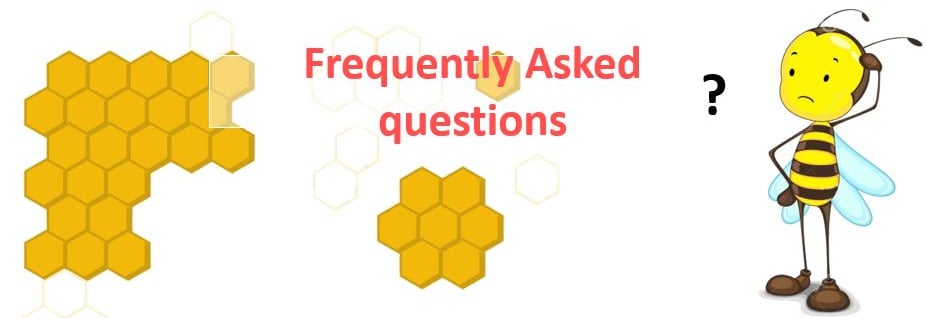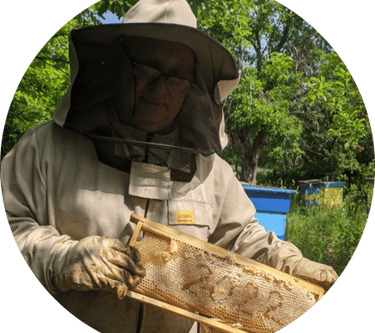Other Frequent questions:
Where should I store honey?
Answer: The honey should be kept in the original container in which it came.
Is Honey safe for dogs?
Answer: Yes, honey is safe for dogs if eaten in small quantity. Smaller dogs can have a teaspoon of honey daily while larger breed can have a tablespoon daily
Does honey help in reducing weight?
Answer: Honey acts as a fuel to make the liver produce glucose. This glucose keeps the brain sugar levels high and forces it to release fat-burning hormones. To benefit from the honey diet, simply replace your sugar intake with honey, throughout the day.
Is honey good for hair?
Answer: Yes, it is completely natural and full of anti-oxidants that helps to keep your hair healthy but we do not recommend applying honey directly on your hair as it’s difficult to rinse out.
Is honey good for skin?
Answer: Honey is an excellent ingredient for your skin that can do wonders! Regularly applying honey to your skin will give you outcomes beyond your imagination and give you good, younger-looking and radiant skin that can go a long way.
Is it true that the thicker the consistency, the better the honey?
Answer: No, it is not true. The purity of honey must not be judged on the basis of its thickness. Thickness has nothing to do with quality.
Can we tell the purity of honey from its colour?
Answer: No, bees collect nectar from various flowers and bring it back to their hive where they make the honey. So, depending on which type of flower nectar the bees gathered, the honey can range anywhere from nearly colourless to dark brown.
Is honey a completely natural food?
Answer: Yes, pure honey is completely natural food.
Is it true that honey that crystallises is not pure honey?
Answer: No, most pure raw or unheated honey has a natural tendency to crystallize over time. Therefore, it is an attribute of pure and natural honey.
Does honey contain pollen?
Answer: Honey Bees produce honey from the nectar of plants, not pollen. Pollen occurs only incidentally in honey. The amount of pollen in honey is very little and not enough to impact the nutrient value of honey.
Does honey have an expiry date?
Answer: No, honey does not have an expiry date, though it can still undergo some natural changes.
How does the taste of honey vary?
Answer: With nectar collected from so many different flowers and with native plants differing from region to region, it’s no wonder honey will taste different. Also, plastic and metal containers can leach chemicals into the honey and can alter the taste. So that accounts for the taste difference.
Does honey help in alleviating cough?
Answer: Yes, honey helps in alleviating cough as it is a remedy to soothe a sore throat. Honey can relieve coughs more effectively than OTC medications that contain dextromethorphan (DM), a cough suppressant.
Does heating destroy the natural flavor of honey?
Answer: Honey should not be heated rapidly, over direct heat.
Can I melt my chrystalised honey to become liquid again ?
Answer: Yes, you can however heating the honey jar needs to be while submerged in water. Then slowly and gradually increase the temperature keeping it in the range between around 30 - 35C (which in fact is the natural temperature in the hive). If the temperature exceed 40C, the positive effects of the bio-active ingredients in honey are gradually killed/diminished.


Are your beehives stationary or they are mobile on platforms ?
Answer: All our hives are stationary, located in 3 separate spots within 3km distance in the vicinity of Ljuti Dol and Ljuti Brod vilages (Bulgaria).
Do you produce Raps, Corn and etc monofloral honey ?
Answer: NO. The region where our beehives are located (they are stationary) have no industrialized agriculture. Hence, technical cultures in sufficient quantities to produce monofloral honey are not present. That is not necessarily a bad thing, as Raps, Corn, Soya... all these technical cultures oftentimes are cared with pesticides, herbicides and poisons which can kill our bees or polute the honey with toxins. (not even to mention the GMO angle here..)
Can we come at the farm with our familiy to participate in honey harvesting or bee care ?
Answer: Visits are always welcome, please contact us upfront with details of your visit. However, we do not yet provide a service and accomodation to participate during harvest. Nevertheless, we do plan to re-assess this in 2023 and development of Covid in Bulgaria.
Can I order higher quantity or other honeybee products that are not in the website ?
Answer: Please use the contact form and we will evaluate the request.
Is the quality of the honey produced tested and controlled ?
Answer: While testing the quality is not mandatory, prudently we submitted testing samples of all our harvests in a German laboratory.
Acacia 2022 harvest: Analysis and Microbiology tests for: E.Coli, Enterobakterien, Listerien and Staphylokokken
Linden 2022 harvest: Analysis and Microbiology tests for: E.Coli, Enterobakterien, Listerien and Staphylokokken
Poli 2022 harvest: Analysis and Microbiology tests for: E.Coli, Enterobakterien, Listerien and Staphylokokken


